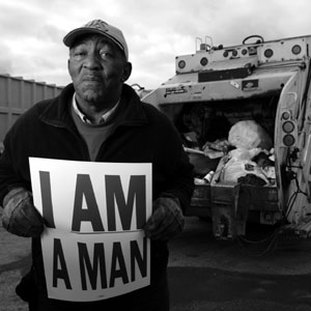 Sanitation worker Ben Jones, now 71, holds a replica placard of the words made famous by strikers in Memphis who demanded better wages and respect. CARL JUSTE / MIAMI HERALD STAFF
Sanitation worker Ben Jones, now 71, holds a replica placard of the words made famous by strikers in Memphis who demanded better wages and respect. CARL JUSTE / MIAMI HERALD STAFF I have looked in vain for the episode on youtube to refresh my memory. But what I remember is the judge being flabbergasted by the excuses of the young man. She said something to the effect that her father worked a menial job to put food on the table, even though times for black men were much harder than they are now. The point was that it’s not so much how much a man puts on the table, but the effort, love and consistency with which he does it.
That means that society must take the responsibility for creating an environment that provides jobs that dignify parents. But right now, few jobs in Kenya pay salaries that can afford the exorbitant fees for healthcare and education, or decent transport, because we are not using public resources to provide decent healthcare, education, transport and recreation. So we do not shield parents from having to be desperate to get their sick children treated, to get their kids get an education or their get kids space to play and relax. To be a parent, means to protect children from indignity. And that is why we Kenyans will keep insisting on good public services so that parents can be parents, not hustlers, for their children.
That is the context in which I raise questions about the recent philanthropic gesture of Muhoho Kenyatta, the son of Kenya’s president. The young man donated 1 million shillings – money that few hard-working Kenyans can come by – to pay bills at Kenya’s top public referral hospital. As you can imagine, many Kenyans are impressed, with some saying that he’s a true leader. In the report, the president’s son is pictured next to a mother with child, wearing a Santa Claus cap (why not a more Kenyan attire? But I digress).
Surely, this is depressing. First of all – as you will see from those who comment – Kenyans hate those of us who criticize philanthropy, because we’re seen to criticize the poor for accepting it, not the rich for stealing and destroying public systems to be able to afford to give philanthropy. But we understand when the poor praise such initiatives, because their circumstances give them no choice. But for those of us Kenyans who can, it is our duty to raise questions about such philanthropy because we were educated by tax payers’ money to use our education to maintain our country’s conscience, not just to get jobs.
The second depressing bit, and for me the more serious one, is our apparent choice to willingly give away our right to parent. So Uhuru’s son can continue his father’s legacy through this grandstanding. But isn’t it the right of every parent to also pass on their own legacy? Yet most Kenyans are finding it difficult to pass our legacy to our kids. Because public education has deteriorated so much, many parents can’t afford private schools and have to pay closer attention to their kids’ homework. When kids get sick, few of us have enough insurance to cover it, and we put out appeals on social media or our places of work. There is nothing as humiliating for a parent as having no guarantees for their children to go to school, to get treated when sick, or to play and relax, because schools and hospitals are in bad shape and the playgrounds have been grabbed.
As if that is not bad enough, it is not the politicians who are parents who are now giving charity to other parents. It is the kids of the politicians giving charity to parents. In African culture, this should be an insult. Problems are supposed to be addressed within the age group. How can adults have pride if politicians’ kids are publicly helping us to be adults in our own homes, to be parents to our own children?
And that’s why we must continue to question initiatives like this. Our adulthood may been dented by economic mismanagement and terrible healthcare, school and transport systems, but we are still adult enough to raise our voice, to say that philanthropy using resources gained through injustice still remains an injustice, and to assert our right to raise our children in dignity by having proper public services to take them to. We, too, are men and women. We too have dignity, and our children must also see that dignity in their parents, so that they too can contribute to society based on the way that we, their parents, are raising them. And we want a Kenya that protects every adult’s right to be an adult for themselves and for the people who love them.
 RSS Feed
RSS Feed
